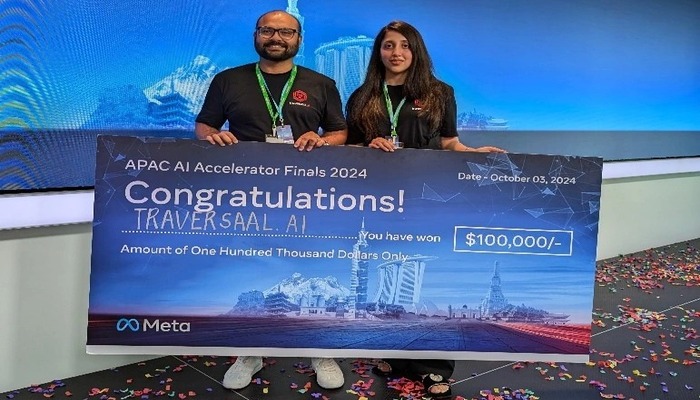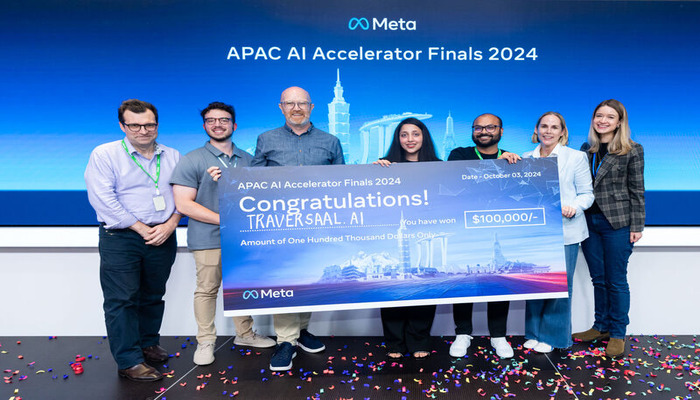
In an ever-evolving world of modern technology, those not proficient in English often feel left out, unable to fully leverage the disruptive advancements in artificial intelligence (AI) and its diverse language models.
Despite leaps and bounds in AI progress, the language barrier remains a major challenge for billions worldwide. Effective communication across languages is critical for global collaboration and understanding, but a lot needs to be done to bring those barriers down and increase the much-needed global participation.
For Pakistan, this challenge has become an excellent opportunity. A Pakistan-based AI startup, Traversaal.ai, is stepping forward with an inclusive solution.
With tech giants like OpenAI, Google, and Nvidia monopolising the AI ecosystem, capturing market share is a constant struggle for smaller entrants in this emerging market.
Most major language models have overlooked the 2.5 billion non-English speakers due to the intricacies of large language models’ (LLMs) textual and language-oriented capabilities. To deal with this disparity, Traversaal.ai has introduced a global solution, laying the foundation for state-of-the-art language models for non-English speakers, starting with Urdu — Pakistan’s national language, also spoken all around the world.

Out of a huge total of 700 participants at the Meta Asia-Pacific (APAC) AI Accelerator Finals, only 13 made it to the final round. Traversaal.ai's Urdu-based AI model outshone the rest, winning a $100,000 grant, while the runners-up from Indonesia and New Zealand received $15,000 and $10,000, respectively.
This is a long-term programme launched to empower innovative companies and developers to seamlessly integrate Llama, Meta's open-source AI model, into their products.
Language models in Urdu: Traversaal.ai’s craft
Talking to Gadinsider, Hamza Farooq, CEO and founder of Traversaal.ai, explained: "Conversing with ChatGPT in Urdu often produces responses lacking cultural context and native eloquence, with hallucination – factually incorrect or irrelevant information – as a frequent issue.”
“Traversaal.ai's innovation enhances Meta's LLama model to provide coherent, culturally aware responses in local languages with the same proficiency as in English.”
According to Farooq, the product goes beyond simple translation; it understands and generates responses with cultural context, empowering 2.5 billion non-English speakers across the globe.
“Primarily intended to fill the vacuum left by tech giants like OpenAI, Google, and Microsoft, Traversaal.ai aims to drive AI adoption in non-English-speaking regions,” said the former senior research manager at Google.
A lack of training on massive datasets in these languages can be blamed for the gross underrepresentation of languages like Urdu in AI.

Traversaal.ai’s non-English models, developed using Meta's Llama 3.1, beat even the most advanced models by 15% in Urdu performance with limited resources. Farooq emphasised that major AI models from companies like OpenAI, Google, and Nvidia primarily cater to English, discouraging most Urdu speakers and other non-English speakers from fully utilising the technology.
Notably, none of the AI firms from the advanced Asia-Pacific countries could match Traversaal.ai’s product, designed to support other languages beyond Urdu.
“Our product will serve both consumers and developers through an accessible API, enabling seamless integration into other models for culturally relevant AI interactions,” Farooq said.
AI: Catalysing Pakistan’s IT sector
Citing a report by Access Partnership, Farooq said AI technologies could help Pakistan boost its IT exports, adding nearly $6.6 billion by 2030.
Commenting on Pakistan's IT sector, he was quite confident about the country’s AI transformation, quietly propelling growth among aspiring developers and researchers.
"By updating curricula and hosting international speakers and summits, universities could expose students to global opportunities and innovations, helping them break out of their shells and engage with the future of AI," said Kanwal Mehreen, NLP researcher at Traversaal.ai.
Having been instrumental in making Traversaal.ai a hit at the Meta APAC AI Accelerator programme, Mehreen highlighted how limited or delayed funding can smother thriving projects, a longstanding issue in Pakistan. To fuel Pakistan’s technological drive, she appealed to the government to support university initiatives like the National Science & Technology Park (NSTP) at NUST.

If Traversaal.ai's model successfully makes it to the execution phase, it will definitely bridge the language gap in AI, ushering in a new era for non-English LLMs.
This and similar developments will ensure a future where language no longer limits access to booming technology, enabling equal participation for all.
Having made a game-changing statement with its groundbreaking language models, Traversaal.ai is set to bridge a gap that most of the tech giants continue to neglect. This breakthrough marks a giant leap toward a future where language is no longer a barrier, letting millions fully harness the untapped potential of AI, regardless of the language they speak. This is just the beginning of an exciting journey for non-English speakers in a world increasingly shaped by AI.
















